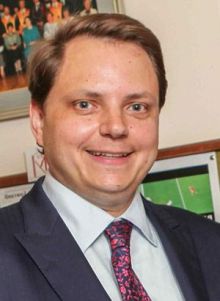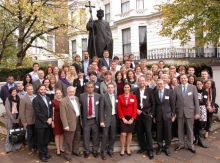Yet it is exactly the instance when “noblesse oblige,” for the institution was founded by His Beatitude Cardinal Josyf Slipyj on May 6, 1979, as an affiliate of the Ukrainian Catholic University (UCU) maintained and supported by the Society of St. Sophia, a UK registered charity.
The institute develops and promotes a greater awareness, understanding and knowledge of Ukrainian history, language, religion, current affairs, economy, literature and culture through educational, professional and networking activities as well as offers social aid to compatriots by way of organizing English language courses and medical associations.
I asked the institute’s director Andy Hunder to tell me about this establishment.
You are located in a really unique and extremely beautiful building. Please, say a few words about its history.
“It is Holland Park, one of the most prestigious areas of London. All the white mansions on our street were built in the same Victorian style. Our building was put up in the late 19th century as residence for a well-to-do family. The hall, where the institute holds public events, used to be a reception room. There still is even the elevator that lifted dishes from the kitchen, there still are – which does not often occur – original wall paintings. So it is an architectural monument which is rather difficult to maintain. Josyf Slipyj purchased this building in 1979 for the needs of the Ukrainian Catholic University.”
So you were associated with the Catholic University from the very beginning?
“We are affiliated with the UCU. It was founded in Rome in 1963 owing to an almost incredible coincidence of historical circumstances. In that year, when Khrushchev was in power, the so-called Cuban missile crisis was resolved, to a large extent, thanks to the efforts of the then Pope John XXIII. Before going to the USSR, President Kennedy’s representatives sought advice from the Pope about what they could request the Soviet leader about. So the Pope advised them to ask him to free Slipyj. Khrushchev received them well and was very surprised that Slipyj was still living – he had known about this case since he was the leader of Ukraine. On arriving in Rome, Slipyj founded the Catholic University. A few affiliates came up. Now that Ukraine is independent the Lviv-based UCU has an enrolment of 1,500 students. We are maintaining close ties. We are trying to help from here in any way we can – mainly by establishing contacts, raising funds, etc.”
Is there a contradiction here, for you are in fact a purely secular institution?
“There are over 20 Catholic universities in Japan. In the US, too, Catholic universities are the most powerful. The famous Oxford also began with philosophy and theology.”
I have seen Ukrainian organizations in other countries and must admit that you stand out against the general background for a very fruitful activity – even though you mainly have to rely on your own resources. How do you manage to do this?
“We work on a non-profit basis. If one likes their job, they do it well. Our approach is simple: do not interfere. What do we really have? A superb location. It is far easier to develop something here. For example, we met some migrant workers and asked them what help we could offer. They said they wanted two things: access to health care and the English language. So we launched an English language course and have a medical facility. We also conduct theatrical rehearsals every Monday and run a Ukrainian language course. Very diverse segments. If someone has an interesting idea, we say: ‘You are welcome.’ The main thing is that nobody should interfere with us.”
You have already mentioned our migrants. And what is the overall picture of today’s diaspora?
“First of all, let us clearly define what the diaspora is, for its traditional image is the hopak, the embroidered shirt, and the Canadian-accented Ukrainian language… We have the old diaspora, but labor migrants constitute the majority. There are a lot of Ukrainians in London – an estimated 100,000. Many things have changed. For example, Ukrainian millionaires like buying real estate in Britain. Are they, their families and their children, who reside or study here, members of the diaspora or not? I don’t think so. But there some affluent people who come to work here, such as bankers and lawyers, and some of them attend our events. Students, together with some teachers, have established the Society of Ukrainian Students. There are 20 Ukrainians employed in the European Bank for Reconstruction and Development. Are they part of the diaspora? Forty out of the fifty of those who attended Andrii Portnov’s recent lecture were born in Ukraine and have come here in the past 20 years. This is noteworthy.”
The so-called new wave of migrants…
“Yes, but the new wave is also very dissimilar. Diaspora is very blurred notion today.”
And which circle do you belong to?
“I represent the old diaspora, even though I worked in Kyiv for many years. The ‘old’ not always trust the ‘new,’ and vice versa. This is a problem to tackle. The imperative is to have an as much broad-based dialogue as possible.”
What is in common between so different people?
“It is the link with Ukraine, Ukrainian origin. This never changes. But what rallies people the most, in spite of their birthplace and economic status, is the church. The church is overcrowded on Sundays and holidays. You can see this on a Palm Sunday, when thousands of people with twigs and baskets walk down Oxford Street. Likewise, everybody takes interest in politics. There are events which can be organized for both segments.”
You mentioned a Ukrainian language course. How many students are taking it currently?
“There were 12 last year and there are 20 now.”
Who are they?
“They are very different people – some are from the old diaspora, some need the language in their professional activities, some have married a Ukrainian woman. Among them are those who take interest in Ukraine and those who have learned Russian before and now decided to master Ukrainian. There is even a Financial Times editor.”
But there still is a disproportion: a hundred students are learning English and only 20 Ukrainian.
“It is the reality. We are asked why we teach English. Because there is a demand. And do not forget that we derive no financial benefit. We only pay salaries to teachers. This demand, these 20 people who have signed up for the course, is rallying the community together, which is, after all, the main thing.”
You also mentioned the medical program. How does it look like in practice?
“The meetings with our migrants made it clear that there was a dire need in information about health care. There have been three instances in the past year, when our job seekers died here because they were afraid to go to the doctor and we had to raise funds to dispatch the bodies to the homeland. We talked this over with local Ukrainian-born doctors, and they established, on their own initiative, the Ukrainian Medical Association of Great Britain in November 2011. We offer furnish them with premises and information, but let me emphasize that our role is minimal. They are very good people and serious professionals. Now they have a network of their own and various programs of cooperation with Ukraine from which they invite doctors for advanced studies. They hold conferences and learn from one another. This is what I mean by dialogue.”
The THEMIS project poll, advertised in your website, can also be viewed, in a way, as dialogue. What kind of an initiative is this?
“It is Oxford University’s International Migration Institute that conducted this poll. They received a special grant and are now studying migration from three countries: Brazil, Morocco, and Ukraine. There are many interesting questions, for example, about the attitude to the law of the migrant who is coming back to Ukraine.”
An extremely interesting question…
“Yes because the law is the holy of holies here. On the whole, the poll shows that 14 percent of Ukraine’s population is in emigration, while the migrants’ earnings account for 4 percent of the country’s GDP.”
What do you think should be done here?
“Look, there are eight members of the Italian parliament, who exclusively deal with the Italians living abroad. I think it would be a very good idea to broach this problem in our country, too. Because 14 percent is approximately 5 million people with their own needs. And there is not a single MP responsible for them. I think it is unlikely so far. The government does not need this because, obviously, those who migrated do not much support it. But it would be very good if they had their own vote in the Verkhovna Rada one day. This is a moot point, but still it should be put on the agenda.”
As we are speaking of Ukraine again, what do you think is the vision of this country for an individual who can look at it from a certain distance?
“I am optimistic: I have a lot of links with Ukraine, including business ties, and I follow the situation. Tendencies are deplorable. Capital is being taken abroad, entrepreneurs are complaining about pressure, illegal seizures continue – it is very difficult, in a word. But still there are good people in Ukraine, who have stayed behind and keep on working there. The question is who emigrates. It is mainly middle-class people, intellectuals.”
A brain drain…
“Yes. However, we think that we are the worst. But, in reality, we just have things to improve and ponder over. It is not in vogue now to speak well of Ukraine: if you say something good, you support the government. I don’t think it is right. There really are many bad things, for which the government is to blame – there is no denying this. But we are too much fixated on politics. But if step aside a little, we will see that very many people are doing good things and believe that they can change something. Therefore, I am taking an optimistic view of this. Clearly, it is the case of ‘hoping without hope,’ but this kind of people are inspiring others. It is very important to give others a hope. We are trying now to spread information about Ukraine on all levels, but we must take a cautious approach because we do not want to be politically biased.”
You know, you said “the question is who emigrates,” but, for some reason, I would continue the phrase as follows: “…and who will beat who.”
“I think it is important ‘who with.’ Yes, the situation is very difficult. The current values are to be revised. We must simply understand this and try to stop fooling one another. In my view, there is a certain light, a little candle that burns in spite of everything. And, what is more, this light will be passing on to others. So it will not be easy, but still we will be moving on.”









